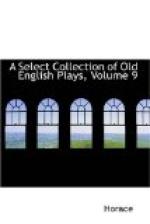THE END.
THE RETURN FROM PARNASSUS.
EDITION.
The Retvrne from Pernassvs: Or, The Scourge of Simony. Publiquely acted by the Students in Saint Iohns Colledge in Cambridge. At London Printed by G. Eld, for Iohn Wright, and are to bee sold at his shop at Christchurch Gate_. 1606. 4to.
[See Hazlitt’s “Handbook,” p. 470. Almost all the extant copies of this drama—and no fewer than ten have been examined—appear to vary in certain literal particulars. Of two copies in the Malone collection, one presents additions which might bespeak it a later impression than the other; and yet, on the other hand, has errors (some of a serious kind) peculiar to itself. The text has now been considerably improved by the collection of the quartos at Oxford.
It was the intention of my kind acquaintance, the Rev. J.W. Ebsworth, Vicar of Moldash, by Ashford, Kent, to have reprinted the “Return from Parnassus” separately; but on learning that I intended to include it in my series, Mr Ebsworth not only gave way, but obligingly placed the annotated copy which he had prepared, at my free disposal.
I have also to thank Dr Ingleby, of Valentines, near Ilford, Essex, for lending me a copy of the play corresponding with one of those in the Bodleian, as regards its occasionally various readings.
A long account, and very favourable estimate, of this drama will be found in Hazlitt’s “Dramatic Literature of the Age of Elizabeth,” 1820.]
[HAWKINS’S PREFACE.]
We can learn no more of the history of this play than what the title-page gives us, viz., that it was “publickly acted by the students in Saint John’s College, Cambridge."[25] The merits and characters of our old poets and actors are censured by the author with great freedom; and the shameful prostitution of Church preferment, by the selling of livings to the ignorant and unworthy, laid the foundation of Dr Wild’s “Benefice, a Comedy,” 4to, 1689.
[Hawkins himself elsewhere (in his “General Introduction”) remarks:—]
As the piece which follows, called “The Return from Parnassus,” is, perhaps, the most singular composition in our language, it may be proper to give a succinct analysis of it. This satirical drama seems to have been composed by the wits and scholars of Cambridge, where it was acted at the opening of the last century. The design of it was to expose the vices and follies of the rich in those days, and to show that little attention was paid by that class of men to the learned and ingenious. Several students of various capacities and dispositions leave the university in hopes of advancing their fortunes in the metropolis. One of them attempts to recommend himself by his publications; another, to procure a benefice by paying his court to a young spark named Amoretto, with whom he had been intimate at college; two others endeavour to gain a subsistence by successively




